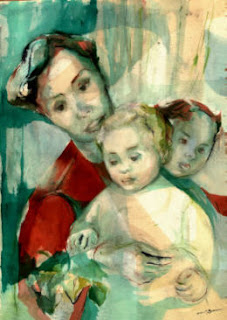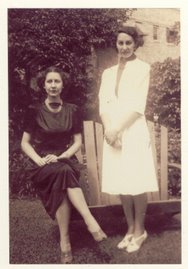
Stage Left Actress in long house dress, white wig. (Jean)
Jean: 'He is a perfect gentleman'- that's what I told her. Poor dear. Thirty-nine and still hoping. I don't understand what she's hoping for. Someone to share the expense of an apartment and the electric bill? A little security in her old age? Possibly. What she really has in mind is dinner for two at McCarthy's Café, long stemmed glasses of wine beside a fireplace, a dozen roses delivered from Bachman's any day but her birthday, and most important- a handsome escort to the Walker Arts and Letters Ball.
Is she really hoping to stand before God and family and vow to "love, honor and obey"? Obey? A man? Not on her life. She would have for Charles, rest his soul ( I guess), but that was so many years ago. She has been on her own for too many years to submit to compliant wifehood. For what Zora needs and wants at this time of her life, Fred will do. Fred will do just fine- for a while. Fred will never marry her or anybody else for that matter. I know she daydreams and chatters on about "that little gold band", but I'd bet that she'd flee the state of Minnesota if it were offered . It will all be all right. Fred is a perfect gentleman.
Center stage
Julie: Who was Charles?
Mary rifles through one stack, retrieves Harp of the Soul holding it up. The image is projected.
Mary: I don't know much about who he was, exactly, but I know that this instrument- this Oriental looking guitar relates to the Charles story.
Julie: I recognize that. It's been sitting around our house ever since I can remember. It's
covered in lizard or snake skin.
Mary: Zora gave it to Bob, and Charles sent it to her from China many, many years ago.
Next Scene
Stage left. Table is turned horizontally with portable drawing board at left end. Zora is seated in front of drawing board, with a watercolor brush in her hand. A San Xian, Chinese instrument is propped against far end of table. Small radio, (1940's) sits at far end of the table. Selected verses of "Night and Day" by Frank Sinatra come up audibly, then song fades. "Night and Day, you are the one- only you beneath the moon and under the sun-"
Zora: (talking to herself) Well, that young man has a pleasant voice. I don't understand what all the fuss is about, though. All those girls, screaming and fainting, making spectacles of themselves. Mobs of Bobby-soxers attending concerts all hours of the night. Where are their parents? one wonders. And what a scrawny little thing to be fainting over!
"Whether near to me, or far, it makes no difference where you are, I think of you- night and day"
Zora's head turns, as she actually listens to the words. She sighs, slowly, carefully, setting down her brush. She closes her eyes.
Zora: (dreamily) Oh, Charles, I still think of you.
Lights fade; and come back up on Stage Left. Table is pushed back; Zora wears a cloche hat- suggesting late 1920's. She is standing before the imaginary door, visibly nervous. A door-bell sounds. A woman comes to the door in long black dress, carrying a handkerchief.
Mrs. Healey: Miss Steenson! What is the meaning of your coming to this house?
Zora: I do apologize, Mrs. Healey, but I haven't heard for so long-
Mrs Healey: (disapprovingly) Charles had been corresponding with you, then.
Zora: Yes, but it's been four months since I received a letter.
Mrs. Healey: (in a stern, formal tone of voice) We have received no word from Charles for some time.
Zora: (tearful) Oh my, I'm so distraught! Isn't there something I can do?
Mrs. Healey: Do! Miss Steenson, I believe that you have done enough!
Zora: I haven't done anything but hope.
Mrs. Healey: It was with your encouragement that Charles set out on this terrible adventure! Charles was a perfectly ordinary, normal person until he started running around with- with artists.
Zora: (weeping) The last thing I ever wanted was that he should leave- but he was so set on it; so fascinated - I never thought that he might not- come back home.
Mrs. Healey: Miss Steenson, you and I have nothing more to say to one another. The only reason you should approach my door again, is to bring news of my son.
Zora: (stunned, sad, but not contrite) I am terribly sorry for you as well as for myself if something has happened to Charles, but it is very unfair to blame me because
your son is so headstrong. (She backs away, wiping her eyes and nose.)
Lights fade and come back up on Stage Left. Table with drawing board is replaced as it was before the Mrs. Healey interlude. Sinatra's Night and Day resumes "In the roaring traffic's boom, in the silence of my lonely room, I think of you- Night and Day"
Zora: What I did say to Charles was- ' I know what it is to believe that there is a bigger purpose to life. I know what it is to feel there is something one simply must do. And the only thing to do about it is to do it.' That, more or less, is what I said.
(pauses as the music fades)
I think I know why those little girls scream and faint over that singer. They know he is singing about something mysterious and true in this life but they are too young to really understand it.
Stage Right. Next Scene
Julie: Poor Zora! Did anyone ever hear from Charles?
Mary: I once heard that Hughberta met a fellow Marine from St. Paul who ran into Charles and
his Chinese wife in Hawaii. But- who knows? Her family could be a little catty about Zora's luckless love life.
Julie: But, she must have been devastated.
Mary: I'm sure she was. But, there might have been a kernel of truth in her mother's assessment of Zora’s true aspirations.
Julie: On some subconscious level, she wanted him to leave?
Mary: From what they had seen and experienced of their parents' marriage, neither of the
daughters could have been too impressed with the institution.
Julie: So instead of living the "normal" life of most women her age, housewife and mother, she was pursuing a career as an artist.
Mary: It's pretty clear that she didn't allow many distractions to her primary interest and I, for one, am glad that she made those choices.

